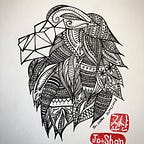Do monkeys fall from trees? (Hint: proverb)
Proverbs or sayings encapsulate the traditional values of a culture; usually convey moral values and wisdom. Personally, I view proverbs as an art form of languages. Using proverbs is not a privilege just for native speakers; even if you think you are not fluent enough in your target language, learning its proverbs helps enhance speaking skills. (They make you sound fancy too!)
Some proverbs cannot be translated literally, but many are loaned from other languages. Oftentimes, many languages in the world even share similar sayings or proverbs.
That being said, Korean, Japanese, and Chinese do share various similar words due to Chinese language influence in Korea and Japan; proverbs are no exception. Proverbs are called 諺語 (yànyŭ) in Chinese, 속담 (sok-dam) in Korean, and 諺(ことわざ kotowaza) in Japanese. Although they may not all originate from Chinese language, they contain the same meanings or convey the same messages.
Let’s look at some sayings that are frequently used in the three languages.
1.
Chinese: 這山望著那山高 (zhè shān wàng zhe nà shān gāo)
Literal translation(Lit.): The other mountain looks higher.
Korean: 남의 떡이 더 커 보인다 (nam-ae- ddeok-ee- deo-ko-bo-in-da)
Lit.: Other people’s rice cakes look bigger.
Japanese: 隣(となり)の芝生(しばふ)は青(あお)い (tonari-no-shibafu-wa-aoi)
Lit.: The lawn next door is green.
The English equivalent of these proverbs is “the grass is always greener on the other side of the fence”.
2.
Chinese: 人有失手,馬有失蹄 (rén yǒu shī shǒu mǎ yǒu shī tí)
Lit.: Humans can make mistakes, horses can stumble.
Korean: 원숭이도 나무에서 떨어진다 (won-sung-ee-do-na-mu-ae-seo-ddeol-o-jin-da)
Lit.: Even monkeys fall from trees.
Japanese: 猿(さる)も木(き)から落(お)ちる (saru-mo-ki-kara-ochiru)
Lit.: Even monkeys fall from trees.
In English, it’s common to say “everyone makes mistakes”.
3.
Chinese: 說曹操,曹操到 (shuō Cáo Cāo , Cáo Cāo dào)
Lit.: Speak of Cáo Cāo (a famous Chinese warlord), Cáo Cāo arrives.
Korean: 호랑이도 제 말하면 온다 (ho-rang-ee-do-jae-mal-ha-myeon-on-da)
Lit.: The tiger comes when you mention it.
Japanese: 噂(うわさ)をすれば影(かげ)がさす (uwasa-wo-sureba-kage-ga-sasu)
Lit.: The shadow appears if you gossip.
The English equivalent in this instance is “speak of the devil”.
4.
Chinese: 薑還是老的辣 (jiāng hái shì lǎo de là)
Lit.: The old ginger is spicier than the young one.
Korean: 구관이 명관이다 (gu-gwan-ee-myeong-gwan-ee-da)
Lit.: The old governor is the wise governor.
Japanese: 亀(かめ)の甲(こう)より年(とし)の功(こう) (kame-no-kou-yori-toshi-no-kou)
Lit.: Effort/experience of age is better than the turtle’s shell.
“The older, the wiser” in English is equivalent to these proverbs.
5.
Chinese: 不入虎穴,焉得虎子 (bù rù hǔ xué, yān dé hǔ zǐ)
Lit.: One can’t catch the tiger cub without entering the tiger’s cave.
Korean: 호랑이 굴에 들어가야 호랑이 새끼를 잡는다 (ho-rang-ee-gul-ae-del-o-ga-ya-ho-rang-ee-sae-ggi-reul-jab-neun-da)
Lit.: You have to enter the tiger’s cave in order to catch the cubs.
Japanese: 虎穴(こけつ)に入(い)らずんば虎児(こじ)を得(え)ず (koketsu-ni-irazun-ba-koji-wo-ezu)
Lit.: You won’t get the tiger cubs if you don’t enter the tiger’s cave.
These are equivalent to the English proverb: Nothing ventured, nothing gained.
6.
Chinese: 苦盡甘來 (kǔ jìn gān lái)
Lit.: Sweetness begins when bitterness ends.
Korean: 고생 끝에 낙이 온다 (go-saeng-gget-ae-nag-ee-on-da)
Lit.: Happiness comes at the end of hardship.
Japanese: 苦(く)あれば楽(らく)あり/ 楽(らく)あれば苦(く)あり
Lit.: If there is happiness, there is bitterness. There is no pleasure without pain.
In English, “no pain, no gain” is commonly said.
7.
Chinese: 有其父必有其子 (yǒu qí fù bì yǒu qí zǐ)
Lit.: With such a father, there will be such a son.
Korean: 그 아버지에 그아들 (ge-a-bo-ji-ae-ge-a-deul)
Lit.: The son is like the father.
Japanese: この父(ちち)にしてこの子(こ)あり (kono-chichi-ni-shite-kono-ko-ari)
Lit.: With such a father, there is such a son.
The English equivalent basically says it the same way: Like father, like son.
8.
Chinese: 一波未平,一波又起 (yī bō wèi píng,yī bō yòu qǐ)
Lit.: A new wave rises before the first wave subsides.
Korean: 산 넘어 산 (san-no-mo-san)
Lit.: Mountains after mountains
Japanese: 一難(いちなん)去(さ)ってまた一難(いちなん)
Lit.: One tragedy after another
The English equivalent is pretty straightforward, which is “one thing after another”.
Numerous Chinese proverbs are extracted from well-known Chinese literature, while some are based on culture, nature, and social sayings. Many Korean and Japanese proverbs are derived from agricultural customs and associated with nature too. Did you notice that Japanese and Korean (mostly) sayings are often related to animals and nature? Interesting, isn’t it? Are there similar sayings in your language? Learn some proverbs or sayings to add some colour to your learning (especially after working hard on grammar lessons).
“Those who know many languages live as many lives as the languages they know.” — Czech proverb
Learn Chinese, Korean and Japanese with Lanny from Eggbun today!
